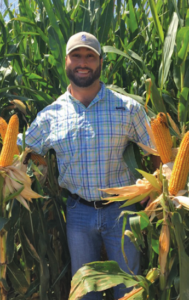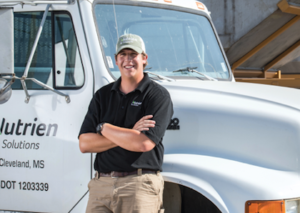By Angela Rogalski • Photography by Rory Doyle
Jeff Tarsi is vice president of retail operations, North America, for Nutrien Ag Solutions. Tarsi says Nutrien Ag Solutions is pro internships in a big way.
Solutions is pro internships in a big way.
“We have a massive intern program across North America,” Tarsi says. “We hire in excess of 200 summer interns a year within our business, and specifically in Mississippi we hire four to six interns per growing season. Those interns predominantly come from Mississippi State, because of the agricultural department there, but we identify these interns through the Mississippi State University Job Fair that they hold twice a year, early fall and late winter.”
And while Mississippi State is where Nutrien Ag Solutions gets the majority of its interns, they do select from other sources as well.
“We have our interns from other universities too; we might not find them through that university, we might hire them on a recommendation as well. And these summer interns primarily help us to maintain our research plots and demonstration plots that we put out. They also do a lot of plant tissue sampling to help us determine the optimal nutrition for a plant in season.”
Tarsi adds that these are paid internships that often lead to employment. “You might call these internships a three-month job interview for us as we look to permanently add new employees to our organization. So, it’s a great opportunity for us to look at a young person at the college level, their work habits, how they relate to our customer base, and generally speaking, when we bring on new employees we try to bring them out of our intern programs, that pool of college interns. And we have extensive in-house training once an intern is hired. We have all levels of training programs that we offer, from management to agronomy.”
 Tyler Kitchings is an intern from Cleveland, who spent his summer with Nutrien Ag Solutions. Kitchings says he absolutely loved the time he had at Nutrien Ag and would recommend any student who is looking to get hands-on experience and knowledge in their chosen field to do an internship.
Tyler Kitchings is an intern from Cleveland, who spent his summer with Nutrien Ag Solutions. Kitchings says he absolutely loved the time he had at Nutrien Ag and would recommend any student who is looking to get hands-on experience and knowledge in their chosen field to do an internship.
“I started the first week in May and it was great. It was a paid internship and I learned so much. I did another internship last year and I felt like I learned so much about the agricultural business. Being from the Delta, agriculture is a big part of it, so I decided that I wanted to be a part of the agricultural industry when I had career choices before me. And I was offered the internship with Nutrien Ag Solutions in March and I started in May. And I have learned more through that internship this past summer than I think I have learned my whole life actually being around it. I would advise anybody who is looking to further their knowledge and experience to do an internship.”
Kitchings goes to Delta State University and is majoring in General Environmental Science. He graduates in December and plans to go to Mississippi State and get his master’s. He says internships also provide a network, a way for students to get their presence known to potential employers.
“Getting my foot in the door is also important to me and internships give students that opportunity. I want to get my name out there so if a spot does open up somewhere, hopefully my name will pop up. And if I prove myself to be reliable and get a reputation for hard work and dependability, that’s really my goal. I think an internship is essential, especially going into a field that requires a lot of hands-on work.”
Over at Delta Research and Extension Center in Stoneville, summer programs are something that has been very beneficial for both the Center and the student worker. Kenner Patton is communications coordinator at the facility, which is a component of the Mississippi State University’s Division of Agriculture, Forestry and Veterinary Medicine.
“Every summer we hire between thirty and forty summer workers. They’re basically trained to assist our twenty-three Ph.D.’s and their technical staff in the field. Some of that is row crop research and some of it is aquaculture. Every now and then there will be some lab work, but predominantly it’s outside field work. Typically these are student workers and they do have to be at least eighteen years old to work here in the summer program. We’ve had some students who have worked here in the summer and then go to Mississippi State and continue to work here, and after graduation they continue to work on advanced degrees. It’s a great program.”
Ryan Tierney is the district sales manager trainee and intern lead at Bayer Crop Science (formerly Monsanto) based in St. Louis. Interns serve an important role at Bayer.
“For student opportunities we’re a very diverse business,” Tierney says. “So, we have lots of student opportunities. A lot of our business segments seek interns for what they can contribute to our organization. For us, we look at those interns to fill future roles in our company. Across the entire business we utilize interns. The group that I work with is in sales. We recruit interns from across the U.S. and the Delta area is a very important part of that for us. We have a cotton business that’s very important to us in the Delta, so we go down there to recruit individuals. And these are paid internships. Our number one feeder pool of talent in my particular area, which is sales, for our trainees and that’s our full time positions is our sales intern program.”
Taylor Boggs is a sales rep and works for Sanders Seed in Cleveland. Boggs got his start in an internship program when he was in college. He says the program really helped him make up his mind in what direction he wanted his career to go.
“I was a little uncertain of what I wanted to do after college. I knew I was there for a reason, I just needed to find it. I met a man, Butch Alpe, who was over the Sanders Seed intern program and he got me set up through the program while I was still at Mississippi State. I went to work for them during the summer and did a variety of jobs. I learned the operation side of the business. The following year they offered me an internship again and that summer I did more hands-on out in the field, and I rode with sales reps, scouted cotton, corn and soybean fields, just an amazing summer where I learned so much. And this internship led to a job offer, so when I graduated I went to work for them straight out of college in 2013. Internships are very important.”
